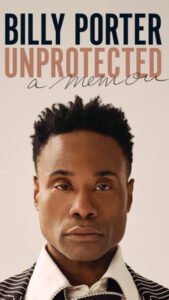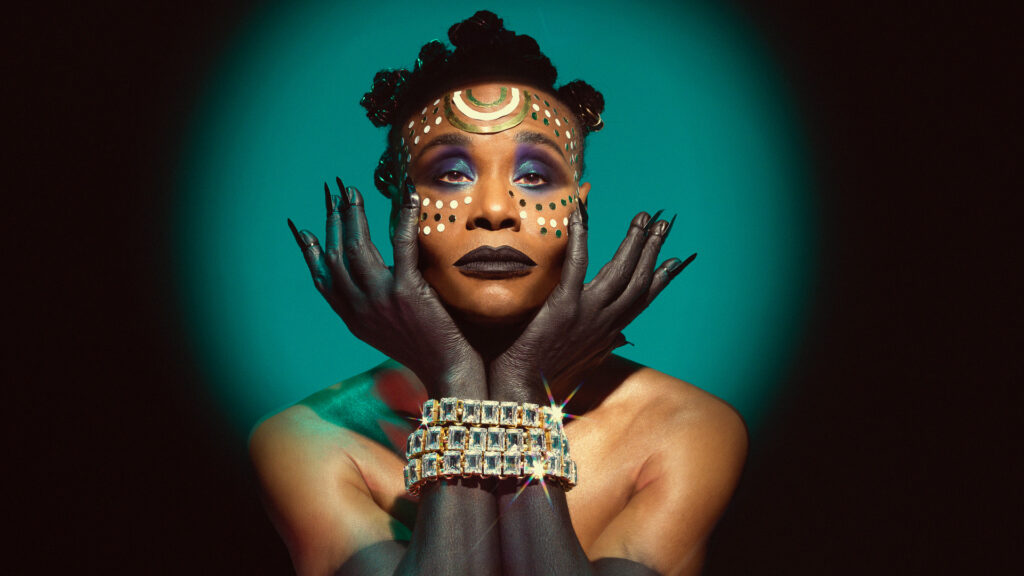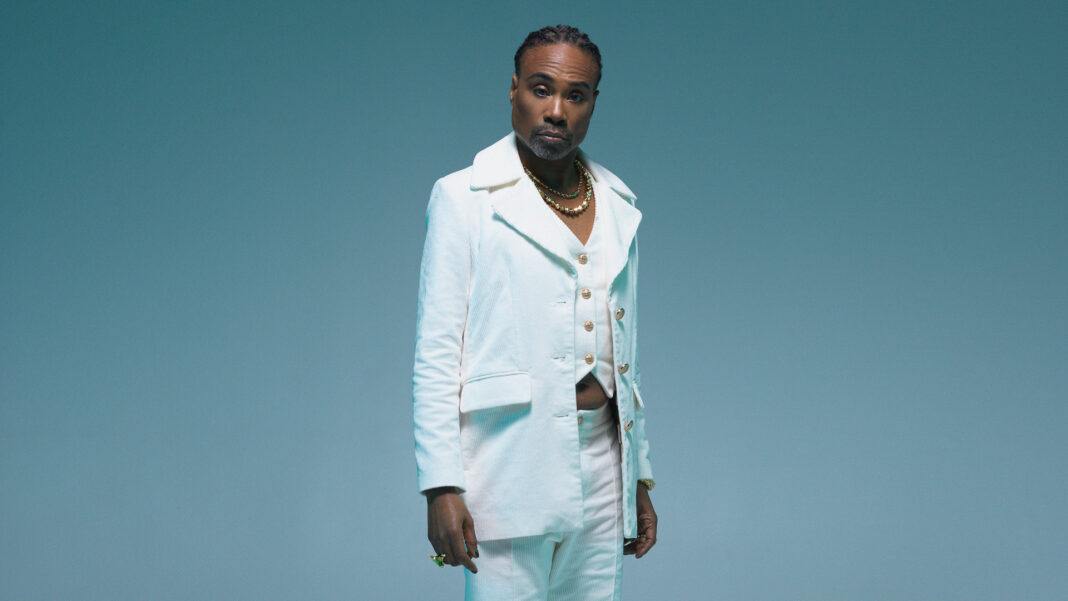THIS IS THE SECOND OF OUR BEST OF 23 REVIEW OF INTERVIEWS: Of course we know Billy Porter can sing. He won a Tony Award for his performance as Lola in Kinky Boots. He appeared as Aubrey Lyles in Shuffle Along, Or the Making of the Musical Sensation of 1921 and All That Followed (a musical, of course). He made his Broadway debut in Miss Saigon.
During rehearsals for his Black Mona Lisa Tour Volume 1, Porter told me when he goes online that “sometimes you hear, I didn’t know Pray Tell can sing!” Which, of course, surprises me since Pray Tell sang in multiple episodes of the television series Pose: “The Man That Got Away,” “For All We Know,” “Love’s In Need of Love Today” and “Home.” Porter won an Emmy Award for his performance in the first season of Ryan Murphy’s series.
His concert tour, to support an upcoming album of the same name, will showcase all aspects of his career. Porter’s tour begins on Saturday, April 29th in Seattle. The 25-city tour will take him during the first week to Salt Lake City (May 1st), Denver (May 2nd), San Jose (May 4th), San Francisco (May 5th) and Los Angeles (May 6th). To see the full itinerary, please go here.
In Los Angeles Porter will be performing at the Hollywood Pantages Theatre which is very near his star on the Hollywood Walk of Fame which he received on December 1st of last year.
Earlier this month I spoke by phone with Porter about the tour, the album that he’s recorded and about his life on and off the stage. What follows are excerpts from our conversation that have been edited for length and clarity.
On stage, you’ve been able to embody Belize (Angels in America), Lola, Aubrey Lyles and so many other characters. With this tour you’ll be doing what a lot of actors consider the toughest of all possible roles: just being yourself. What challenges and opportunities does your Black Mona Lisa Tour Volume One offer you?
First of all, that is a really amazing question. I moved to New York City December 27th, 1992 to be in the original cast of Miss Saigon. It was the middle of the AIDS crisis. Broadway Cares/Equity Fights AIDS and The Actors Fund taught an entire generation how to activate. I was trying to get a better deal at the very same time, which I did. My first R&B/soul album came out in 1997. So my trajectory in my twenties was Broadway shows and getting a mainstream contract.
The only way to do that was to do concerts. I did concerts three, four or five times a year fronting a band. So showing up as myself, it’s something that I’ve been doing for the entirety of my career since I was 21 years old. So I am so happy to be able to get on stage and just be myself because I know how to do that very well.
Your book, Unprotected, created such an intimate dialogue with your audience. How would you like this upcoming album and tour to continue that dialogue and move the conversation forward?

I want the next layer to include one of my original dreams which was to be the male Whitney Houston. That was always my goal. Like I said, my first album came out in ’97. The mainstream industry was homophobic. They put my ass out. I had all these years to make something of myself. Now I get to come back to the mainstream industry on my own terms.
This album is everything that I want to say musically and exactly how I want to say it musically, visually, conceptually. All of it is rooted and grounded in the life that I led. I’m so excited to share it with the world. Ironically, I spent the first 25 years of my career trying to get people to take me seriously as an actor. Now I sort of exist in so many different creative spaces.
The unfortunate part of our world is that very often these creative spaces don’t talk to each other. The literary people don’t talk to the music people. The music people don’t talk to the film and TV people. The film and TV people don’t talk to the fashion people. The fashion people don’t talk to the theater people. So the audiences are all there for different reasons. It’s like, okay, so I have some educating to do, you know? My hope is that this concert with music, since it is a universal language, will bring all of my disparate audiences together.
How autobiographical with this whole album be? The first line in your first single, Baby Was a Dancer, references your own birthday.
It’s completely autobiographical. It’s completely my life. Just like my book, it’s a celebration of life. It’s a celebration of how I can heal trauma. The concert is going to be a celebration of life and love and hope and joy. I’ve been saying I want to give the world a big bear hug. We’ve all been inside of and continue to be inside of a collective trauma that is devastating. I want to be a part of the healing. I’m coming to minister to the people in these 25 cities and start the process of healing together. The only way we can make a difference in this world to heal, to create change, is to do it together. Now we can gather again. So my hope, my intention, is to get the ball rolling with that. My hope is that audiences will leave inspired and hopeful and be called and re-called to action.
What discoveries have you made about yourself since the publication of Unprotected and will those discoveries find their way into Black Mona Lisa?
They have found their way. The album is done. What discoveries have I made? I would say that healing is a journey, not a destination. If we can learn to enjoy the journey in all its forms, even when it’s uncomfortable – and a lot of times it’s going to be uncomfortable -when we can understand that the space of the journey is where the peace is, where the joy is, where the hope lies with healing. It’s in the journey that we find that space in our lives. That’s what I really have been able to lean into that since the book and the trauma therapy that went along with writing that book.
What I couldn’t have known when I saw you in Angels in America in 2010 is that while you’re playing this incredible angel of a nurse who dispenses truth and compassion in equal measure, you were carrying a secret inside about your own health status. What was that experience for you, knowing what you knew about yourself while appearing in this play?
As you know from the book, going to see Millennium Approaches [part one of Angels in America] in 1994, while I was in playing the Teen Angel in Grease, prancing around like a Little Richard on crack, our theaters backed up against each other. The actors from Angels in America, I was friends with a couple of them. [They] were like, “We could always hear in our dressing room where your number was!” That was the play that began the evolution of Billy. I saw Belize and I saw myself – a reflection of a Black queer man who was not the butt of the joke. Who was not the one that was reviled. Who people didn’t want to kill. Who was the moral compass of the show. It changed everything for me.
When I got my diagnosis of HIV in 2007 my biggest fear was that people would find out and I would never work again. So to have my return to the New York stage after a decade of not working be the very piece that changed everything for me, that really changed my life. That was all I was thinking about at that time.
Because it was a piece about HIV I could just be in it. As an actor that’s what we strive for. We strive to not have to be acting, but to just be. So it was magical for me. I was able to think about something else. I was able to not have to wallow in that. By that point I was on medication. My T-cell count was higher than yours is now. That medication is actually a miracle drug. The diabetes and the HIV diagnosis simultaneously turned this Black man into the most healthiest I’d ever been. I was relieved to be working again and happy to be healthy. That was really where I was when I was doing that.

From the outside looking in on your life, it would seem like you have found a way to make the world your oyster right now. Do you feel that way? What would you say to others, particularly those who go to your concert, is the best way for them to live with such apparent joy and appreciation?
You choose it. Joy is an action. Love is an action. Hope is an action. All of those things are actions that don’t just happen. So we have to be conscious and sure of it at every turn and every success. There’s equal measure of challenges. The challenges never stop. They just are different. The more success I have, the more intense the challenges are. So do not get it twisted. The world is sort of an oyster and there’s a lot of bullshit, too.
We last spoke in 2018. I asked you at that time if it was possible for our government to come closer in parity with the country’s culture. You said “I get to be part of that change, that catalyst that creates changes.” Giving everything that’s now going on with the LGBTQ+ community, what are the conversations you hope your audiences will have after seeing these concerts about further changes, not just in society, but also in ourselves?
I think the big takeaway from what’s going on right now is to remember that we’re all human. Just in my estimation and what I’ve observed, being separated and isolated in our homes for two years because of the pandemic allowed for inhumanity to flourish and it allowed for people to forget that we’re all human beings. It allowed for that to foster a bit. That’s what I’m excited about with my work is that it’s a reminder that we’re all human beings and we don’t have to agree on everything. We can agree to disagree. The conversation is not about tolerance or acceptance. The conversation is a demand for universal respect for humanity. Period.
So you don’t get to create legislation that takes rights away because you don’t agree with me. That’s not what America is. That’s not what any place should be like. My rights have been up to legislation since the moment I could comprehend it and before that, too. And it still continues to be okay. That still continues to be the way of the world. It’s not just America, it’s all over the world.
It’s like What is this? It’s hundreds and hundreds and hundreds of years of this? It’s crazy. It is. The answer from me is fuck you. If the worst thing that I do is cuss, because that’s what people like to talk about, well, we have much bigger problems than my fuck you. Come on, the sky IS falling, right? It already is falling. I need to see some urgency in these motherfuckers now.
Main Photo: Billy Porter (Courtesy Republic Records)











